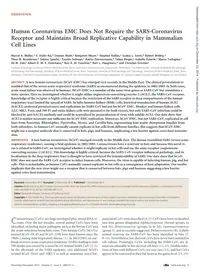
2012 Human Coronavirus EMC Does Not Require the SARS-Coronavirus Receptor and Maintains Broad Replicative Capability in PDF
Preview 2012 Human Coronavirus EMC Does Not Require the SARS-Coronavirus Receptor and Maintains Broad Replicative Capability in
Human Coronavirus EMC Does Not Require the SARS-Coronavirus Receptor and Maintains Broad Replicative Capability in Mammalian Cell Lines Marcel A. Müller,a V. Stalin Raj,b Doreen Muth,a Benjamin Meyer,a Stephan Kallies,a Saskia L. Smits,b Robert Wollny,a Theo M. Bestebroer,b Sabine Specht,c Tasnim Suliman,a Katrin Zimmermann,d Tabea Binger,a Isabella Eckerle,a Marco Tschapka,e Ali M. Zaki,f Albert D. M. E. Osterhaus,b Ron A. M. Fouchier,b Bart L. Haagmans,b and Christian Drostena Institute of Virology, University of Bonn Medical Center, Bonn, Germanya; Viroscience Lab, Erasmus MC, Rotterdam, The Netherlandsb; Institute of Medical Microbiology, Immunology and Parasitology, University of Bonn Medical Center, Bonn, Germanyc; Institute of Pharmacology and Toxicology, University of Bonn Medical Center, Bonn, Germanyd; Institute of Experimental Ecology, University of Ulm, Ulm, Germanye; and Virology Laboratory, Dr. Soliman Fakeeh Hospital, Jeddah, Kingdom of Saudi Arabiaf ABSTRACT A new human coronavirus (hCoV-EMC) has emerged very recently in the Middle East. The clinical presentation re- sembled that of the severe acute respiratory syndrome (SARS) as encountered during the epidemic in 2002/2003. In both cases, acute renal failure was observed in humans. HCoV-EMC is a member of the same virus genus as SARS-CoV but constitutes a sister species. Here we investigated whether it might utilize angiotensin-converting enzyme 2 (ACE2), the SARS-CoV receptor. Knowledge of the receptor is highly critical because the restriction of the SARS receptor to deep compartments of the human respiratory tract limited the spread of SARS. In baby hamster kidney (BHK) cells, lentiviral transduction of human ACE2 (hACE2) conferred permissiveness and replication for SARS-CoV but not for hCoV-EMC. Monkey and human kidney cells (LLC-MK2, Vero, and 769-P) and swine kidney cells were permissive for both viruses, but only SARS-CoV infection could be blocked by anti-hACE2 antibody and could be neutralized by preincubation of virus with soluble ACE2. Our data show that ACE2 is neither necessary nor sufficient for hCoV-EMC replication. Moreover, hCoV-EMC, but not SARS-CoV, replicated in cell lines from Rousettus, Rhinolophus, Pipistrellus, Myotis, and Carollia bats, representing four major chiropteran families from both suborders. As human CoV normally cannot replicate in bat cells from different families, this suggests that hCoV-EMC might use a receptor molecule that is conserved in bats, pigs, and humans, implicating a low barrier against cross-host transmis- sion. IMPORTANCE A new human coronavirus (hCoV) emerged recently in the Middle East. The disease resembled SARS (severe acute respiratory syndrome), causing a fatal epidemic in 2002/2003. Coronaviruses have a reservoir in bats and because this novel vi- rus is related to SARS-CoV, we investigated whether it might replicate in bat cells and use the same receptor (angiotensin- converting enzyme 2 [ACE2]). This knowledge is highly critical, because the SARS-CoV receptor influenced pathology, and its localization in the deep respiratory tract is thought to have restricted the transmissibility of SARS. Our data show that hCoV- EMC does not need the SARS-CoV receptor to infect human cells. Moreover, the virus is capable of infecting human, pig, and bat cells. This is remarkable, as human CoVs normally cannot replicate in bat cells as a consequence of host adaptation. Our results implicate that the new virus might use a receptor that is conserved between bats, pigs and humans suggesting a low barrier against cross-host transmission. Received 9 November 2012 Accepted 12 November 2012 Published 11 December 2012 Citation Müller MA, et al. 2012. Human coronavirus EMC does not require the SARS-coronavirus receptor and maintains broad replicative capability in mammalian cell lines. mBio 3(6):e00515-12. doi:10.1128/mBio.00515-12. Editor Michael Buchmeier, University of California, Irvine Copyright © 2012 Müller et al. This is an open-access article distributed under the terms of the Creative Commons Attribution-Noncommercial-Share Alike 3.0 Unported License, which permits unrestricted noncommercial use, distribution, and reproduction in any medium, provided the original author and source are credited. Address correspondence to Bart L. Haagmans,
